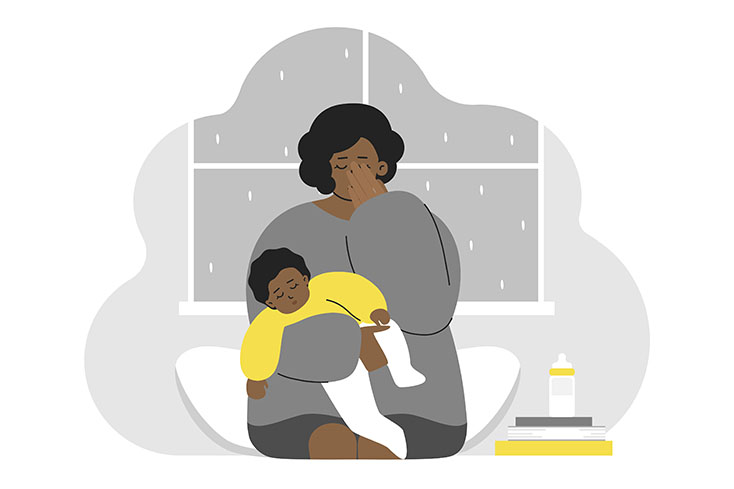
Addressing the Increased Risk of Postpartum Depression for Black Women
Postpartum depression (PPD), also called perinatal depression, is a mood disorder that occurs during pregnancy or after a recent birth. The condition can cause problems with bonding between mother and child, sleep and feeding issues, and mental, emotional, verbal and developmental complications in children. PPD affects one out of eight new mothers, but the risk is significantly higher in new mothers of color. While black women are more at risk of having PPD, they are less likely to receive help.
Several factors, including lifestyle and living conditions, may contribute to the increased incidence of PPD among black women and the lack of treatment.
Identifying and understanding these factors can be a life-saving intervention. Ultimately, access to care that incorporates cultural understanding is critical to improving health outcomes for expectant Black women and women who have recently had a baby.
Symptoms of Postpartum Depression

The main symptoms of PPD, according to the CDC, are:
- Feeling angry
- Fears of harming the baby
- Guilt
- Isolating from family
- Crying more than normal
- Feeling disconnected from their babyIncreased Risk of Postpartum Depre
Although the symptoms of postpartum depression have been widely documented, much of the research conducted and screening tools developed have focused on white women. As a result, clinicians may overlook somatic symptoms that are more likely to occur in non-white women, such as high blood pressure or unexplained body aches, pain and nausea. It is crucial to consult your doctor if you are a new mother experiencing these symptoms.
Why Black Women Have a Higher Risk
Black women are three times more likely to have a maternal death than white women in the U.S. Awareness of this risk can heighten stress and anxiety during pregnancy, potentially placing women of color at risk for PPD. Many researchers suggest providers prioritize examining social factors to understand further and address these health disparities. Social factors that can place Black women at increased risk for PPD include:
- Food insecurity
- Low income or education
- Lack of access to quality care or health coverage
- High stress living environments
- Exposure to trauma
Obstacles to Receiving Mental Health Care

Many black women who experience PPD remain silent due to stigma and shame. In the black community, asking for help is often seen as a sign of weakness. Additionally, when someone decides to seek guidance, they are likely to turn to family, friends or religious leaders rather than trained personnel. In the U.S., Black individuals are less likely to receive treatment than nearly all other racial and ethnic groups regarding mental illness. Reasons why many people do not seek professional help, may include:
- Perceived racial discrimination
- Experience with incorrect diagnoses
- Diversity in health care or lack of representation
- Stigma and misconceptions of mental illness in the Black community
- Distrust of the health care system
One common symptom of PPD is feeling hopelessness. If such feelings become serious, the new mother may risk her life or commit suicide. Black mothers must receive help as soon as possible to prevent symptoms from escalating.
Resources For Culturally Supportive Care
Therapy Resources
Therapy is effective in treating depression and reducing depressive symptoms in women with PPD – if mental health providers are culturally sensitive and appropriately trained.
Listed below are websites with information on finding providers of color:
- Therapy for Black Girls
- Black Therapist Rock
- National Black Doula Association
- Melanin and Mental Health
- BackDoctor.org
Support Groups
Contact with local support groups and breastfeeding counselors can help reduce PPD rates. Support groups are a great way to gain knowledge, network with other mothers and connect with community resources.
The Shades of Blue Project
Mothers can register to join weekly virtual meetings by submitting their names and email addresses. There are four different support groups offered: pregnancy and postpartum, teen mom, Spanish speaking and infant loss.
National Association of Professional and Peer Lactation Supporters of Color
Expecting and new mothers can go to this site and search the directory for lactation support. Assistance can be provided in person (if local) or electronically (telephone, email and video chat).
Nutritional Resources
PPD has been linked with lacking affordable and nutritious food. The Women, Infants and Children (WIC) program provides families with healthy food and nutritional education for mothers and their children. Mothers can contact their local WIC site online or by phone to complete an application.
Let us know in the comment section whether you or someone you know has had PPD.
You May Also Like

Self-Concept in Psychology
2022-03-23
How To Stop Being the Victim of Your Life?
2021-09-02
